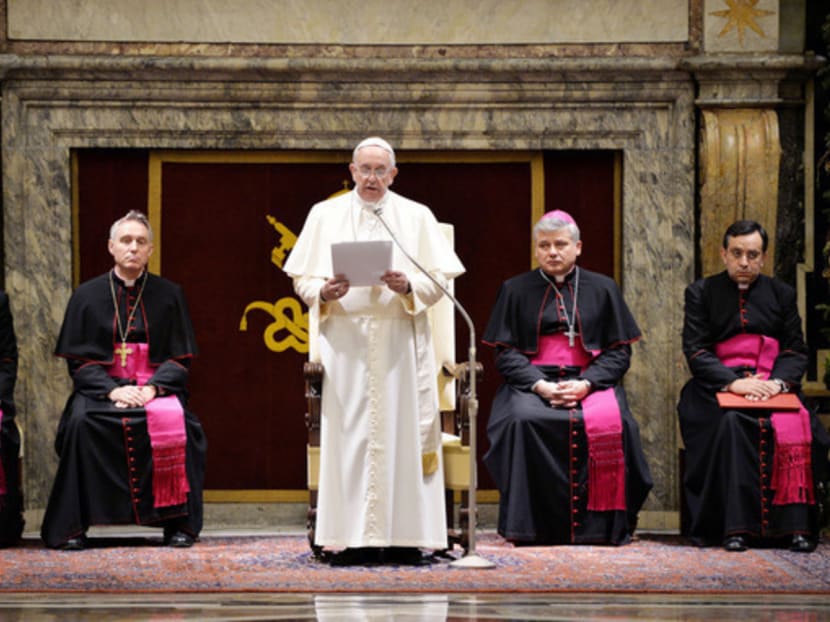Pope raps Vatican bureaucrats over lust for power, hypocrisy
VATICAN CITY — Pope Francis issued a blistering critique yesterday of the Vatican bureaucracy that serves him, denouncing how some people lust for power at all costs, live hypocritical double lives and suffer from “spiritual Alzheimer’s” that has made them forget they are supposed to be joyful men of God.

The annual Christmas greeting comes at a tense time for the Curia and few were smiling as Pope Francis (centre) issued a blistering critique yesterday of the Vatican bureaucracy.
Photo: Reuters
VATICAN CITY — Pope Francis issued a blistering critique yesterday of the Vatican bureaucracy that serves him, denouncing how some people lust for power at all costs, live hypocritical double lives and suffer from “spiritual Alzheimer’s” that has made them forget they are supposed to be joyful men of God.
Pope Francis’ Christmas greeting to the cardinals, bishops and priests who run the Holy See was no joyful exchange of holiday good wishes.
Rather, it was a sobering catalogue of 15 sins of the Curia that Pope Francis said he hoped would be atoned for and cured in the New Year.
He had some zingers: How the “terrorism of gossip” could “kill the reputation of our colleagues and brothers in cold blood”, how cliques could “enslave their members and become a cancer that threatens the harmony of the body” and eventually kill it by “friendly fire”, as well as how those living hypocritical double lives were “typical of mediocre and progressive spiritual emptiness that no academic degree can fill”.
“The Curia is called on to always improve itself and grow in communion, holiness and knowledge to fulfil its mission,” said the Pope. “But even it, as any human body, can suffer from ailments, dysfunctions, illnesses.”
Pope Francis, who is the first Latin American Pope and had never worked in the Italian-dominated Curia before he was elected, has not shied from complaining about the gossiping, careerism and bureaucratic power intrigues that afflict the Holy See. However, as his reform agenda gathers steam, he seems even more emboldened to highlight what ails the institution.
The cardinals were not amused. The speech was met with tepid applause and few were smiling, as Pope Francis listed one by one the 15 Ailments of the Curia that he had drawn up, complete with footnotes and biblical references.
The annual Christmas greeting comes at a tense time for the Curia — the central administration of the Holy See that governs the 1.2 billion-strong Catholic Church.
Pope Francis and his nine key cardinal advisers are drawing up plans to revamp the whole bureaucratic structure, merging offices to make them more efficient and responsive.
The Vatican’s finances are alsoin the midst of an overhaul, with the Pope’s finance tsar, Cardinal George Pell, imposing new accounting and budget measures on traditionally independent congregations not used to having their books inspected.
Yet, it was perhaps Cardinal Pell that Pope Francis had in mind when he complained about the temptation to lust for power even if it means defaming or discrediting others “in newspapers or magazines to show themselves as more capable ... in the name of justice and transparency”.
Cardinal Pell recently penned an explosive essay in Britain’s Catholic Herald, in which he said his team had discovered that the financial situation of the Holy See was “much healthier than it seemed, because some hundreds of millions of euros were tucked away in particular sectional accounts and did not appear on the balance sheet”.
The Vatican later clarified that the money had not been hidden and that nothing illicit had been going on.
Over the weekend, the Jesuit magazine America reported that an internal Vatican memo had undercut Cardinal Pell’s claim of having found the cash in the first place, saying the funds kept in the Vatican Secretariat of State were well known and had been duly reported, used to cover Vatican losses and special projects, and well managed over the years. AP






